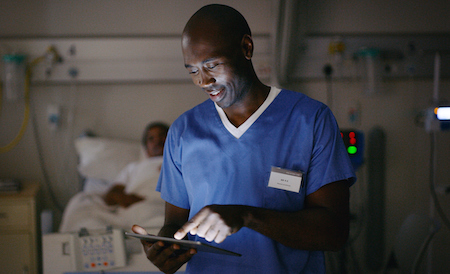Technology is playing a transformative role in healthcare across Africa, addressing critical challenges such as limited access to medical services, shortages of healthcare professionals, and the burden of infectious and chronic diseases. Here’s how technology is improving healthcare on the continent:
1. Telemedicine and Remote Care
- Virtual Consultations: Platforms like Hello Doctor, Vezeeta, and mPharma connect patients with doctors remotely, enabling access to medical advice in rural or underserved areas.
- Specialist Access: Telemedicine allows patients to consult specialists without traveling long distances.
Impact: Improved access to medical expertise, especially in remote areas where healthcare facilities are scarce.
2. Mobile Health (mHealth) Solutions
- Health Education: Mobile apps and SMS services provide information about maternal health, nutrition, and disease prevention. Examples include M-TIBA and MomConnect.
- Disease Monitoring: Apps like CommCare enable community health workers to track diseases, monitor patients, and share data with clinics.
Impact: mHealth empowers patients with knowledge and helps healthcare workers deliver more efficient care.
3. Disease Surveillance and Management
- Epidemic Tracking: Tools like HealthMap and mHero use data from mobile devices to monitor and predict disease outbreaks like malaria, Ebola, and COVID-19.
- AI and Big Data: Predictive analytics help governments and organizations identify health trends and allocate resources effectively.
Impact: Early detection and rapid response to outbreaks reduce the impact of epidemics.
4. Digital Health Records
- Electronic Medical Records (EMRs): Platforms like OpenMRS and CareCloud are digitizing patient records, reducing errors, and improving continuity of care.
- Interoperability: Digital records make it easier for healthcare providers to share information, enhancing coordination across facilities.
Impact: Improved efficiency, reduced paperwork, and better patient outcomes.
5. Diagnostics and Treatment Innovations
- Point-of-Care Testing: Portable diagnostic devices enable testing for diseases like HIV, malaria, and tuberculosis in remote settings.
- AI in Diagnostics: AI-powered tools like Zebra Medical Vision analyze medical imaging to detect conditions such as cancer or fractures.
Impact: Faster and more accurate diagnoses save lives, especially in areas with few healthcare workers.
6. Access to Medications
- Pharmaceutical Distribution: Companies like Zipline use drones to deliver essential medicines and vaccines to remote areas.
- E-Pharmacies: Platforms like MYDAWA and mPharma improve access to affordable, quality-assured medications.
Impact: Reduced supply chain delays and improved availability of essential medicines.
7. Training and Support for Healthcare Workers
- E-Learning Platforms: Tools like MEDINEX and AMREF’s Leap platform provide training for healthcare workers, ensuring they stay updated on medical advancements.
- AI Assistance: Chatbots and AI tools offer decision support for diagnosing and managing complex cases.
Impact: Enhanced skills and confidence among healthcare professionals.
8. Maternal and Child Health
- Prenatal Care Apps: Programs like GiftedMom and Safe Delivery App provide expecting mothers with prenatal advice and access to midwives.
- Child Vaccination Tracking: Digital tools like EIR (Electronic Immunization Registries) ensure children receive timely vaccinations.
Impact: Improved maternal and child health outcomes.
9. AI and Machine Learning
- Predictive Healthcare: AI helps identify high-risk patients for diseases such as diabetes or hypertension, enabling early interventions.
- Drug Development: AI accelerates research into treatments for diseases prevalent in Africa, like sickle cell anemia and malaria.
Impact: Enhanced preventive care and targeted treatments.
10. Mental Health Support
- Teletherapy: Platforms like Wazi and Bonga offer online counseling and mental health support.
- AI Chatbots: Chatbots provide 24/7 mental health resources and crisis intervention.
Impact: Increased access to mental health care, particularly in regions where stigma limits traditional therapy.
11. Health Financing and Insurance
- Mobile Payment Systems: Platforms like M-TIBA allow patients to save and pay for healthcare via mobile money.
- Affordable Insurance: Technology enables micro-insurance models tailored to low-income households.
Impact: More people can afford and access healthcare services.
12. Public Health Campaigns
- Social Media and SMS: Governments and NGOs use digital channels to run campaigns on disease prevention, such as COVID-19 vaccination drives or malaria awareness.
- Interactive Voice Response (IVR): Multilingual voice messages reach populations with low literacy rates.
Impact: Greater public awareness and behavioral change.
Challenges and Opportunities
Challenges:
- Limited internet access and unreliable electricity in rural areas.
- High cost of advanced technologies and devices.
- Data privacy and security concerns.
Opportunities:
- Partnerships between governments, tech companies, and NGOs to scale up innovations.
- Investment in infrastructure to expand internet and mobile network coverage.
- Training programs to enhance digital literacy among healthcare workers.
By harnessing technology, Africa is overcoming longstanding healthcare challenges, improving access, quality, and outcomes for millions. These innovations are shaping a more equitable and efficient healthcare system for the future.

